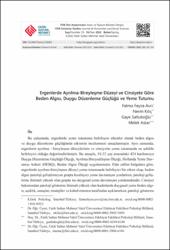Ergenlerde Ayrılma-Bireyleşme Düzeyi ve Cinsiyete Göre Beden Algısı, Duygu Düzenleme Güçlüğü ve Yeme Tutumu
Künye
AVCI, Fatma Feyza, KILIÇ, Nevin, Gaye SALTUKOĞLU & Melek ASTAR. "Ergenlerde Ayrılma-Bireyleşme Düzeyi ve Cinsiyete Göre Beden Algısı, Duygu Düzenleme Güçlüğü ve Yeme Tutumu." FSM İlmî Araştırmalar İnsan ve Toplum Bilimleri Dergisi, 19 (2022): 287-314.Özet
Bu çalışmada, ergenlerde yeme tutumunu belirleyen etkenler olarak beden algısı
ve duygu düzenleme güçlüğünün etkisinin incelenmesi amaçlanmıştır. Aynı zamanda,
ergenlerin ayrılma - bireyleşme düzeylerinin ve cinsiyetin yeme tutumunda ne şekilde
belirleyici olduğu değerlendirilmiştir. Bu amaçla, 18-22 yaş arasındaki 424 katılımcıya
Duygu Düzenleme Güçlüğü Ölçeği, Ayrılma Bireyselleşme Ölçeği, Hollanda Yeme Dav ranışı Anketi (DEBQ), Beden Algısı Ölçeği uygulanmıştır. Elde edilen bulgulara göre,
ergenlerde ayrılma-bireyleşme düzeyi yeme tutumunda belirleyici bir etken olup, beden
algısı patoloji geliştirmeyen grupta kısıtlayıcı yeme davranışını yordarken, patoloji geliştirme ihtimali yüksek olan grupta ise duygusal yeme davranışını yordamaktadır. Cinsiyet
bakımından patoloji gösterme ihtimali yüksek olan kadınlarda duygusal yeme beden algısı, açıklık, amaçlar, stratejiler ve kabul etmeme tarafından açıklanırken, patoloji gösterme ihtimali yüksek olan erkeklerde ise sadece açıklık tarafından açıklanmaktadır. Elde edilen
bulgular literatür bulguları ile birlikte ele alınarak tartışılmıştır. he aim of the study was to investigate body perception and emotion regulation difficulty factors determining eating attitudes of adolescents. As well, evaluate the impact
of separation-individualization levels and gender on eating attitudes of adolescents. The
participants were 424 adolescents between the ages of 18 and 22. The instruments used
were the Emotion Regulation Difficulty Scale, the Separation Individualization Scale,
the Dutch Eating Behavior Questionnaire (DEBQ) and the Body Image Scale. According
to the findings, the level of separation-individuation is a determining factor in the eating
attitude of adolescents, and body image predicted restrictive eating behavior in the group
that does not develop pathology, and emotional eating behavior in the group with a high
probability of developing pathology. In terms of gender it is found that emotional eating
is explained by body image, openness, goals, strategies, and refusal in women who are
more likely to show pathology. As for men with a high probability pathology, emotional
eating behavior was predicted by just openness. The results were discussed in the light of
related literature.



















